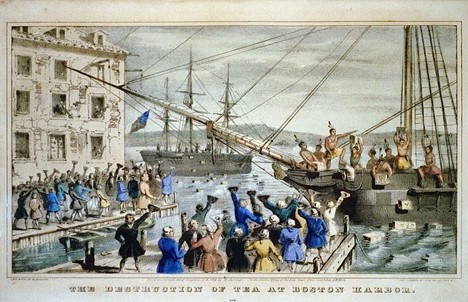Choose Your Shop
Food History
Boston Tea Party

Though the British had won the Seven Years’ War, the Empire was in dire financial distress after the war ended. They had spent vast amounts of resources and capital throughout the war and the results seemed to have brought to naught. In an effort to remedy the situation, the British Parliament sought to replenish its depleted reserves by imposing taxes on trade with North American colonies.
The policy was set forth by the Parliament in 1773. The purpose behind implementing a new tax regime was to further the cause of the East India Company. The Company would bring in greater revenue for trade it would conduct with the British Colonies, hence, the British Parliament granted the company a monopoly on the right to sell tea in North America.
Traders protested against the heavy taxes that were imposed on them while the East India Company enjoyed rebates. The Parliament authorized the shipment of thousands of pounds of tea via the Company ships to Boston, Charleston, New York City, and Philadelphia. On the arrival of the ships, the Governor of Boston demanded that they be docked into the harbor and that colonial merchants pay the duties on the cargo while letting the Company ships unload. There was a hue and a cry following which a group of Bostonians disguised themselves as Native Americans and boarded the company ships.
The Bostonians proceeded to dump hundreds of crates of tea into the Boston harbor. The estimates pointed that the rebels had destroyed almost 10 thousand pounds worth of tea that belonged to the British East India Company. The adamant British, instead of reforming their tax policies or accommodating the demands of the colonists, responded to the incident by passing more repressive taxes on the citizens of Boston and shut down Boston’s port. They defended the acts by implicating the Bostonians and demanding that they pay for the loss through taxes. In response, the American colonies called for a continental congress. The First Continental Congress convened in the Autumn of 1774 and approved a general boycott of British goods. This tussle turned into a struggle against the British. The stage was set and thus began the American War of Independence.
A wide variety of quality ingredients are available from Arkadia supermarkets in Malta and Gozo, including Arkadia FoodExpress Swatar and Arkadia Food Market Valletta.
Stay up to date with our food history posts - https://arkadiafoodstore.com/foodhistory/
Tell your Facebook friends about it.
